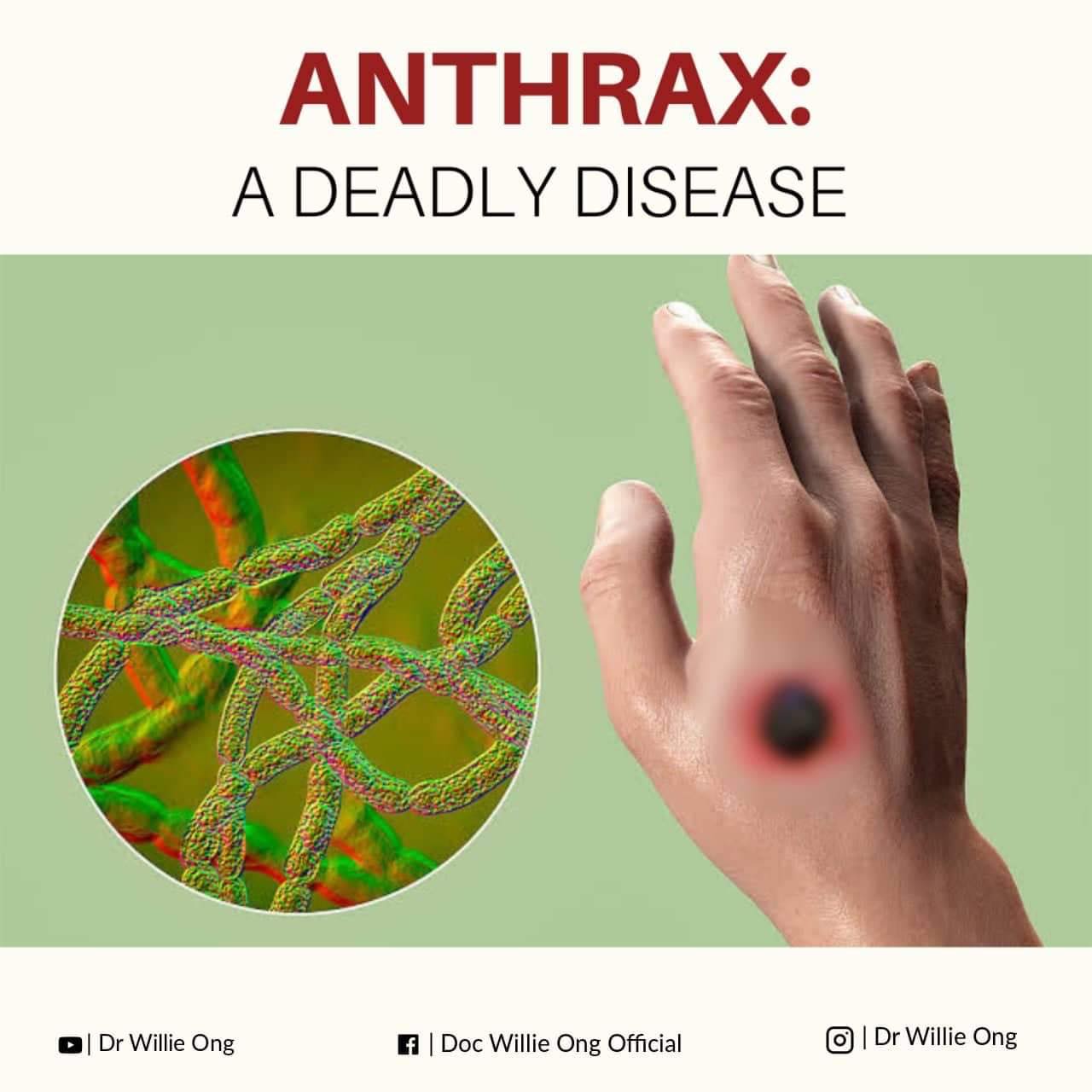By Doc Willie Ong
What is anthrax and how does it spread?
A spore-forming bacteria called Bacillus anthracis, causes anthrax. Anthrax is a very dangerous disease and it is not common. Livestock and wild animals are the principal victims of anthrax. People can get anthrax by direct or indirect contact with sick animals.
The anthrax bacteria secrete spores, which reside inside a protective shell. In the soil, these spores can live for months and even years. If anthrax spores reach your body, they will easily break and release bacterium, which contain harmful chemicals that will poison the person.
Infection can spread to humans by direct or indirect contact with sick animals. There are people who have injected heroin who also got anthrax. People who deal with anthrax is in a laboratory. A biological warfare who are exposed are also at high risk.
Symptoms of Anthrax
1. Contact with the skin or Cutaneous anthrax:
If you come in contact with anthrax, you may get a tiny, itching sore on your skin. It resembles an insect bite in appearance.
The lesion becomes a blister very rapidly. It subsequently turns into a black-centered skin ulcer. You may also develop flu-like symptoms of fever and headache. Symptoms usually appear one to five days following the exposure.
2. Anthrax inhalation:
This is the deadliest form of anthrax and often leads to death. Inhalation of anthrax spores generally causes symptoms within a week. However, symptoms can appear as soon as two days after exposure and can last up to 45 days.
Inhalation anthrax causes the following initial symptoms:
- Symptoms of a cold
- Throat irritation
- Fever
- Muscular pain
- Cough
- Breathing problems
- Tiredness
- Trembling
- Chills
- Vomiting
- Meningitis
3. Gastrointestinal anthrax:
After eating poorly cooked meat from a sick animal, the person can get anthrax symptoms within a week of exposure.
Ingestion of anthrax causes the following symptoms:
- Fever
- Loss of appetite
- Nausea, vomiting
- Severe stomach discomfort or pain
- Swelling of the neck
- Diarrhea with blood
4. Injection anthrax:
It is a newly discovered anthrax infection pathway and has only been documented in Europe.
It is acquired through injecting illicit substances.
Among the early symptoms are:
- Redness around the puncture site
- Large swelling
- Shock, low blood pressure
- Failure of many organs
- Meningitis
Who are at risk?
For a person to get anthrax, he or she must be in direct contact with anthrax spores. This is more likely in the following settings:
- Military and deployed in an area exposed to anthrax risk (biological warfare)
- Working in a laboratory setting
- Handling animal skin, furs in an area with anthrax
- Injecting illegal drugs, like heroin
What are the complications?
- The body will not be able to respond to infections normally and lead to multi-organ failure.
- Meningitis, which is swelling of the membranes and fluid covering the brain and spinal cord.
What is the treatment for anthrax?
If you suspected that you’ve been exposed to anthrax, get medical attention immediately, even if you don’t detect any symptoms.
A blood test will be performed to see if you have antibodies to anthrax or toxin produced by anthrax bacteria. Swabs of your skin, spinal fluid, feces, or mucus from your cough may also be taken.
Describe what occurred to you to your doctor. You may be tested with a chest X-ray or CT scan if your doctor suspects you inhaled anthrax spores.
How you were exposed to anthrax will determine the therapy. Antibiotics will be administered to you and other supportive therapy.
Prevention of anthrax:
Antitoxin –
A type of drug that counteracts the toxins produced by anthrax bacteria. It may also required inhaled anthrax, that can be treated with anthrax antitoxins such as obiltoxaximab or raxibacumab.
A special kind of vaccine reserved for high-risk individuals is available. But because of it’s side vaccine it is not recommended for the public.
Avoid sick animals:
If you are in a country where anthrax has been reported, avoid contact with livestock and wild animals as much as possible. And refrain eating meat that hasn’t been fully cooked.
Take precautions when handing animal products, when working or processing imported hides, wool and fur.



